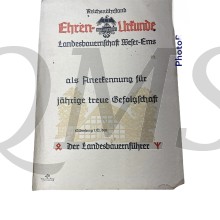WK2 Urkunde Treue Gefolgschaft der Reichsnahrstand Landesbauernschaft Weser-Ems
he Reichsnährstand had legal authority over everyone involved in agricultural production and distribution. It attempted to interfere in the market for agricultural goods, using a complex system of orders, price controls, and prohibitions, through regional marketing associations. Under the “Hereditary Farm Law of 1933” (Reichsnährstandsgesetz), farmers were bound to their land since most agricultural land could not be sold. The law was enacted to protect and preserve Germany's smaller hereditary estates that were no larger than 308 acres. Below that acreage, farmlands could “not be sold, divided, mortgaged or foreclosed on for debt.” Cartel-like marketing boards fixed prices, regulated supplies and oversaw almost every facet in directing agricultural production on farmlands. Besides deciding what seeds and fertilizers were to be applied to farmlands, the Reichsnährstand secured protection from selling foreign food imports inside Germany, and placed a “moratorium on debt payments.


